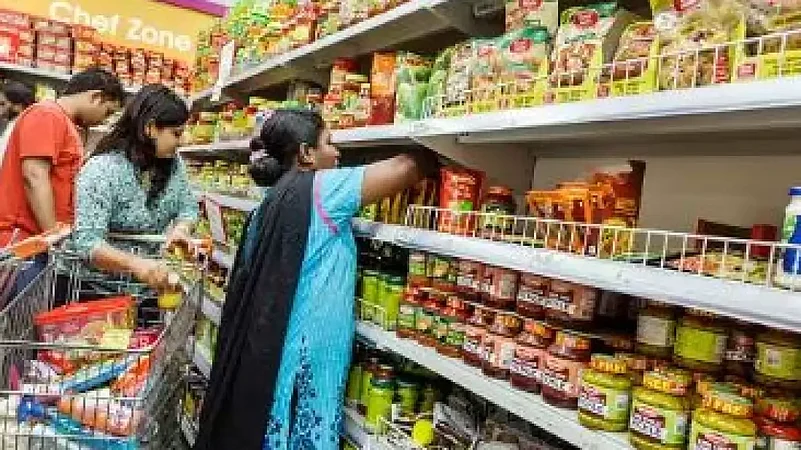India's rural poor and marginalized communities are consuming high quantities of ultra-processed and packaged food, a recent study has said.
Rural Poor In UP, Bihar Consuming High Quantities Of Ultra-processed Food: Survey
The study, conducted in seven blocks in Bihar's Gaya and Uttar Pradesh's Varanasi districts, revealed that Dalit families were spending 94 per cent of their income on food and about 10-15 per cent of that expenditure was on processed and packaged foods such as chocolates, carbonated drinks, jellies, biscuits and chips.

The study, conducted in seven blocks in Bihar's Gaya and Uttar Pradesh's Varanasi districts, revealed that Dalit families were spending 94 per cent?of their income on food and about 10-15% of that expenditure was on processed and packaged foods such as chocolates, carbonated drinks, jellies, biscuits and chips.
The survey included 330 families. The majority of those surveyed were women, 74 per cent.
"The survey once again reaffirms that the prevalence of ultra-processed food consumption is a country-wide phenomenon seen in all social grouping and income levels," said the study. It was conducted by the Varanasi-based NGO Peoples’ Vigilance Committee on Human Rights (PVCHR) and PIPAL (People’s Initiative for Participatory Action on Food Labeling) – a national grassroots initiative for a healthier food system.
For perspective, average urban middle-class families spend 10 per cent of their food expenses on ultra-processed food items, according to a report by Lancet Commission.
The study by PVCHR and PIPAL was released on March 20 in New Delhi in a round-table meeting held for Members of Parliament and civil society representatives.
The findings showed that families with lower or no literacy were likely to spend more on packaged food.
Around 90 per cent of the respondents earned Rs.400 or less daily and lived at least 20 km from the closest urban centres. While 40 per cent?of the families surveyed belonged to the Dalit community, over one-third came from the Other Backward Classes section. Majority of those surveyed were illiterate.
Consumption of ultra-processed food items is higher in households which are either illiterate (10 per cent) or have only primary level education (17 per cent) compared to households with secondary (6.6 per cent) or higher education (5.9 per cent), the study said.
India faces a double burden of malnutrition, where undernutrition and obesity co-exist. Over one-third of children under age 5 in India are stunted and underweight. On the other hand, obesity among children is on the rise, ?with around 3.4 per cent?of children either overweight or obese. This is a more than 50 per cent?increase in the last five years.
PVCHR and PIPAL say their joint study reinforces the concern that sub-optimal or poor nutrition is escalating diet related non-communicable diseases (DR-NCDs) in India, putting at risk millions, particularly children across all socio-economic categories.
Poor nutrition, as a result of the growing consumption of ultra-processed foods containing high levels of sugar, sodium and saturated fats, is considered by experts as a key risk factor.
The survey pinpointed four factors leading to unregulated consumption of ultra-processed food among rural and poor families; increasing urbanization or urban functions in small towns and rural areas; rising income among all strata of society; less time for food preparation due to high work-stress environment and lucrative marketing strategies of the food and beverage industry.
Ashok Bajpai, senior Rajya Sabha MP from BJP, who attended the round-table, expressed concern that Dalits and families from other backward classes who earn meagre incomes were increasingly relying on easy-to-purchase food items without realizing the negative impact it has on their health.
B.P Saroj, ?BJP MP from Machhlishahr in UP, observed that in the state, ready-to-eat or ready-to-heat ultra-processed food was fast becoming the food of choice for the migrant workforce who neither have the time nor resources for cooked meals.
A member of the Consultative Committee, Ministry of Food Processing Industries, Saroj said it was the right time for a policy instrument that can empower people to make healthier choices and save lives. "Evidence from across the world and India has shown that a simple front-of-pack label that warns people about unhealthy ingredients will have the most impact. We provide our support to FSSAI and eagerly await a?FOPL (Front of Package Labelling) regulation that is good for the people of this country," he said.
Lenin Raghuvanshi, the founder of PVCHR, said the adverse impact of ultra-processed food and beverages was even more pronounced on children who are stunted or have received inadequate nutrition early in their life. "They are more susceptible to obesity and may have a higher risk of NCDs as adults," he said.
- Previous Story
 Marital Rape 'A Social Issue Not Legal', Centre Files Affidavit With SC Against Criminalisation
Marital Rape 'A Social Issue Not Legal', Centre Files Affidavit With SC Against Criminalisation - Next Story
























